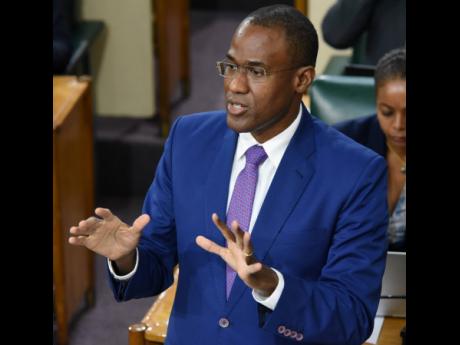EU auto waiver ‘here to stay’
Clarke says zero duty was phased over 10 years
The zero customs duty now applied to motor vehicles originating from within the European Union, is the culmination of a 10-year process to phase out the taxes, Finance Minister Nigel Clarke said on Wednesday in an exclusive interview with the...
The zero customs duty now applied to motor vehicles originating from within the European Union, is the culmination of a 10-year process to phase out the taxes, Finance Minister Nigel Clarke said on Wednesday in an exclusive interview with the Financial Gleaner.
It was recently announced that the Jamaican Government had removed import duties on European motor vehicles, sparking questions about the implications for the auto sector and the tax revenue the country would forego as a result.
Jamaica collected $1.5 billion in duties on European auto imports last year, but Clarke has suggested that not all of those revenues would necessarily be eliminated.
The arrangement was part of the EU-Cariforum Economic Partnership Agreement, EPA, aspects of which have have been in place since 2008.
As part of that trade pact, to which the Caricom bloc and Dominican Republic were parties, Clarke said duties on motor vehicle imports from the European Union would be eliminated once they met very clearly defined criteria, including certification of their origin.
“The agreement called for a gradual reduction in the duty rate over a 10-year period,” Clarke said, while citing motor vehicles with engine sizes over 2,000cc, or 2 litres, as example.
“That duty was once at 40 per cent. This was reduced to 20 per cent and harmonised with other imports; and then last year, it was reduced to 10 per cent; and then this year to zero,” he said.
He also clarified that the agreement did not eliminate all taxes on EU auto imports.
“The border charges payable on all imports include GCT, and with respect to all cars, there is SCT; and then there is the environmental levy, and so on,” Clarke said. GCT refers to the general consumption tax, and SCT to the special consumption tax.
Checks with Jamaica Customs Agency and motor vehicle importers indicate that there are a total of five duties and charges that are applied to motor vehicle imports.
Therefore, a typical Toyota Corolla with a 1,800cc engine or a Subaru with a 2,000cc engine would attract duties and changes on the cost, insurance and freight, or CIF value, ranked and compounded in the following order:
● Import duty of 20 per cent and 40 per cent for engine sizes above 2 litres;
● SCT of 20 per cent;
● Environmental levy of 0.5 per cent;
● Customs administration fee, CAF, of between $55,000 and $57,500; and
● GCT of 15 per cent.
The rates may vary for other classes and types of motor vehicles.
Clarke was clear in asserting that only the import duty had been removed under the EU agreement.
“This development is just a part of Jamaica fulfilling its obligations under the EPA that we signed 15 years ago,” he said.
Quizzed about the revenue implications, the finance minister said the available data is that import duty on European cars was about $1.5 billion in financial year 2022-23, but noted that the figures does not distinguish vehicles that don’t fall within the EU agreement.
It is not unusual for a motor vehicle to be labelled, say, Japanese or European but manufactured in another country such as Mexico or the United States. For those vehicles to meet the rules of origin requirement under the EPA, they would have to be manufactured mainly using parts sourced from within the EU, a bloc that comprises 27 countries.
Checks by the Financial Gleaner on the numbers and types of European motor vehicles imported into Jamaica over the past two to three years yielded nothing, as the Trade Board did not respond to the request for data.
Clarke says the rescinding of the removal of duties is not an option.
“This is an agreement that we signed in 2008 and the Government of Jamaica stands by that agreement,” he said.


